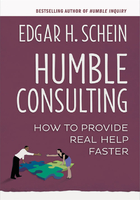Talking
IN 1993, AFTER I LEFT SHELL and moved to South Africa, I started Generon Consulting. My partners were Joseph Jaworski, who by then had also finished his assignment at Shell, and Bill O'Brien, the former president of Hanover Insurance. Later Otto Scharmer of the Sloan School of Management at the Massachusetts Institute of Technology joined us as a research partner. The Mont Fleur approach became well known, and teams of people all over the world—in and across companies, governments, and civil society organizations—asked us to help them work on their most important and difficult problems.
Through this work, I gradually, over the next decade, pieced together an answer to my second question, which I came to think of as: How can we solve tough problems peacefully? The answer turned out to be both simple and practical: by opening up our talking and listening. With that insight, I can look back and see the key pattern across all the projects my colleagues and I have worked on. At one extreme, some projects were characterized by completely closed talking and listening, and these ended up getting stuck or getting dealt with by force. Other projects were characterized by completely open talking and listening, and these succeeded in creating new realities. Most projects fell somewhere between these two extremes. I have laid out the stories in this book in this opening-up order, rather than chronologically. Each chapter that follows illustrates and explains one degree of greater openness than the chapter before. This progression offers a theory and practice of how to solve tough problems.
Through this work, I also gradually pieced together how to do my job as a process facilitator. A friend once sent me an email with this message: “How does one learn good judgment? Experience. And how does one gain experience? Bad judgment.” My hard-won experience has taught me that I also am least effective when I am closed and most effective when I am open. But this simple opening-up turned out to be far more subtle and challenging than I would ever have imagined.
Being Stuck
SOUTH AFRICA had been stuck in apartheid for decades, but by the time I first went there in 1991, South Africans were in the middle of changing that. What does a tough problem look like when it is still stuck in the apartheid syndrome?
It looks like the Basque Country did in October 2002. When I went there to share my South African experiences, Basque nationalists were fighting for independence from Spain, or at least for the right to vote on it. Non-nationalists and the Spanish government wanted the Basque Country to remain part of Spain. Over the previous five years, this conflict had grown increasingly polarized and violent. The nationalist terrorist group ETA (Euzkadi to Askatasuna, which means “Basque Homeland and Freedom” in the Basque language) had killed more than 850 people and planted bombs in Bilbao, Madrid, and tourist resorts, so that hundreds of public officials needed full-time bodyguards. The police had killed 170 people and made more than 11,000 arrests. The Basque Country was thoroughly stuck and therefore increasingly dangerous. As one local peace researcher explained to me, “A conflict that does not move positively, moves negatively.”
I met with partisans and politicians from all sides. I found them gracious and hospitable, but also frightened, guarded, angry, and frustrated. They were all keen to tell me their stories: ETA killed my husband; Franco's soldiers killed my mother's father; the nationalists are trying to intimidate us; the Spanish are trying to erase our culture. They all explained why they were the victims and the others were the villains.
I noticed how much less willing the parties were to talk with each other than with me. The Spanish government had just outlawed the ETA-linked political party, Batasuna, on the grounds that it was a front for terrorists, and had broken off all political contact with the nationalist Basque regional government on the grounds that the Basque problem required a police rather than a political solution. The premier of that regional government had just put forward a plan for a referendum on quasi-independence and said that he would implement it with or without the cooperation of the Spanish—which the Spanish prime minister promptly denounced as the ranting of a fanatic. Amplifying the conflict, each side's media allies demonized their opponents and denounced anyone who met with the other side. Nobody could get all the parties to talk together directly. Even Elkarri (the Basque word for “together"), a grassroots peace organization, could only succeed in getting some of the parties to talk, and those only through intermediaries and in private. Even so, after a year, they could not get agreement even on a one-page public statement on a process for moving towards peace.
Gorka Espiau, an Elkarri staff member, explained to me the interaction between violence and nondialogue: “If I know that you, my opponent, would approve of my being killed, that you do not have a basic respect for human life, then how can I have an open, human dialogue with you? And yet without such a dialogue, how can we end the violence? We have to start with a political dialogue to reach an agreement to stop the killing. Then we can have the human dialogue that we need to resolve the deeper underlying conflict.”
I met with an opposition member of the Basque regional legislature who told me that the violence had now undermined all communication among the politicians. Once-cordial working relationships in the parliament had broken down into acrimonious exchanges and stony silences. After this meeting, I went [8]upstairs to sit in the visitor's gallery to watch the parliamentary debate. One member was giving an impassioned speech about a crucial legal aspect of the conflict. In the half-empty chamber, not one of the other members was listening to him: they were talking on their cell phones, reading newspapers, dealing with their correspondence, napping. I asked the usher if it was usually like this. “Yes,” he answered. “The members usually make up their minds before the debate as to how they are going to vote, and so they don't need to listen to the speeches.”
The Basque premier said two things that allowed me to glimpse the costs of being stuck and the benefits of getting unstuck. He told me a story that I had heard from other Basques on both sides: “The conflict here is not between different tribes or ethnic groups. Many of our families are split down the middle between nationalists and non-nationalists. When my brothers and sisters and I go home to our parents for Christmas, my mother begs us not to talk about politics. It's a terrible feeling, as though I have to cut off a part of myself.” Later, when I asked him what it had been like being premier during 1998 to 1999, when ETA had declared a cease-fire, his face became wistful: “You can't imagine what it was like for me to be able to hear a telephone ring without fearing that it would be news of another bombing or assassination. That was such a wonderful time in Basque society: an emotional blossoming.”
In each of my meetings, I talked about the South African transition and about Mont Fleur and the many other informal forum-style meetings among all the parties. The Basques were intrigued—they had never had an all-party meeting-but pessimistic. “That might be useful here,” each of them responded, “but I don't think it would be possible. I'm not sure that they would be willing to talk with us, and we're not really ready to talk with them.” (About such stalemates, Nelson Mandela once said, “One effect of sustained conflict is to narrow our vision of what is possible. Time and again, conflicts are resolved through shifts that were unimaginable at the start.”)
This pattern of not talking and not listening is a symptom of being stuck.[9] Whether or not the actors are on speaking terms, they are not on listening terms. Like the Basque parliamentarians (and many parliamentarians elsewhere), they have made up their minds before their opponents speak. Even if they are silent and pretending to listen, they are really only “reloading,” rehearsing their rebuttals. They are in fact listening only to themselves, to the tapes they play over and over in their heads about why they are right and others are wrong. My partner Otto Scharmer calls the kind of talking that takes place in these situations “downloading” because the speaker is reproducing an old file without alteration. The actors sometimes fight openly and violently, and sometimes cover their differences with politeness, skirting sensitive subjects in order to keep the peace. Either way, they are stunted, unable to express who they are in new ways and unable to take in what others are telling them. If they can change this pattern and start to talk and listen, they blossom.
Not talking and not listening are common; they are not limited to troubled nations. As I drafted this chapter, my twenty-seven-year-old daughter Pulane and I were enacting this same pattern. She was home for the holidays and had stayed out all night without telling Dorothy and me where she would be. So we fought about her “irresponsibility” and my “interference,” downloading an argument we had had on and off for years. Each of us knew with certainty that we were right and the other was wrong. “If she won't listen to me telling her that she is wrong,” I thought, “then why should I bother to talk to her? And if she is going to continue to talk nonsense about my being wrong, why should I bother to listen to her?” Sometimes we yelled, and sometimes we politely avoided the subject. In our own way, we were as stuck as the Basques.
There are two ways to try to unstick a stuck problem. The first is for one side to act unilaterally—to try imposing a solution by force or violence. In the Basque Country, ETA, the Spanish government, and the Basque government were each, in their own way, trying to do this.
The second way to unstick a problem is for the actors to start to talk and listen in order to find a way forward together. South Africans arrived at their dialogue reluctantly and only after both sides had discovered that they were unable to force their solution on the other. Pulane and I also eventually grew out of our fighting: our love for one another prevented us from walking away and encouraged us to keep trying to communicate. But, as of this writing, the actors in the Basque Country are not yet ready to talk and listen. The situation is not ripe enough. Dialogue cannot be forced, and so peacemakers must wait patiently for an opening.
Dictating
IN ORDER TO UNSTICK a stuck problem peacefully, the people involved in the problem have to talk with and listen to one another. But there is more than one way of talking and listening, and some ways hardly help at all.
I observed such hardly helpful communication in the problem—ridden context of Paraguay. Paraguayans seem to enjoy telling awful and bizarre stories about their country. The first evening I was there, in 2001, a presidential candidate boasted to me about the suicidal War of the Triple Alliance (1864–1870), in which Paraguay battled its three much larger neighbors, Brazil, Argentina, and Uruguay, and lost half of its people. Men had to be imported to re-grow the population. “We are,” he concluded with a flourish, “a fierce and crazy people.”
Their recent history has been similarly awful. General Alfredo Stroessner was elected president in 1954 and stayed in power for thirty-five years through siege, harassment, murder, political purges, and bogus elections. His overthrow in 1989 released a wave of excitement and optimism. Then resignation set in again. Many of the country's institutions are corrupt. A Paraguayan CEO told me that the majority of his law school class did not study because they had purchased their degrees in advance. At the time, he was fighting a trumped-up fraud case in the Supreme Court in which his opponent had paid off several of the judges. A journalist told me that the president of Paraguay drives a stolen car and that the president of Uruguay had his watch stolen off the lectern when he gave a speech to the Paraguayan Congress. “An optimist in Paraguay,” someone quipped, “is someone who says, ‘Things are good! We are better off today than we will be tomorrow!’”
I went to Paraguay to work with forty-five of the country's most open-minded and public-spirited politicians, activists, businesspeople, generals, judges, journalists, intellectuals, peasants, and students. They had agreed to talk together, but I was puzzled by how slowly our work progressed. Most of them seemed to be exceptionally suspicious, cynical, and pessimistic, and hesitant about speaking openly. They deferred to me even on questions for which I had no good answers. Conversations went in circles; understandings came unraveled; commitments were not kept.
I spoke about these patterns with Milda Rivarola, a member of the team and a respected historian. “You have to understand the impact that the dictatorship had on people,” she explained. “We needed approvals and permissions for everything. No criticism of the government was allowed. The only way to have influence was to be a part of the government, the military, or the governing party. And by and large people acquiesced. Stroessner had a network of spies and informers (many of them had volunteered!) who set people against each other. Just like in other totalitarian and post-totalitarian societies, social fragmentation was and is severe. What you are seeing in this group—the low levels of trust and initiative—are the after-effects of this repression.”
The director of our project was a civic leader named Jorge Talavera, who had worked for decades in adult education and leadership development. He was sanguine about the situation and patient with our slow progress. “Paraguayans aren't used to managing themselves,” he explained. “They are always asking ‘Who's the boss?’ People say that President Wasmosy, our first civilian president after Stroessner, used to assert his authority by asking, ‘Who's the penis here?’ In this project we are asking people to value their own experiences and to have confidence that they can influence the future. So we are asking them to make a fundamental shift in their way of being. This will take time.”
In a dictatorship, the dictator does not listen, and the people are afraid to talk. The results are pessimism and cynicism; lack of self-confidence and self-management; hesitation to speak up and stand up; and painfully slow innovation.
Now that I have seen this pattern of behavior in Paraguay, where it was painted in bright colors, I am able to recognize it elsewhere. Today I see it in most organizations, where bosses give orders and employees are afraid to say what they think. Just compare what people say in meetings with their bosses to what they say outside the meetings, in the HERD (a corporate colloquialism for hallways, elevators, restrooms, and while driving). A long-suffering civil servant in Mexico told me a joke about a government minister who asks one of his officials if crocodiles can fly. “No minister,” the official replies. The minister then says, “I think that they can.” “You're right, minister,” the official quickly replies, “but very close to the ground.” This joke could be told about the bosses and subordinates in most of the organizations I have worked with.
The root of not listening is knowing. If I already know the truth, why do I need to listen to you? Perhaps out of politeness or guile I should pretend to listen, but what I really need to do is to tell you what I know, and if you don't listen, to tell you again, more forcefully. All authoritarian systems rest on the assumption that the boss can and does know the one right answer.
I had never noticed the parallel between political dictatorship and organizational authoritarianism because authoritarianism was the water I had always swum in. When I joined Pacific Gas and Electric, it never occurred to me to question the strict reporting lines. Until I attended the Management Committee's retreat, I had assumed that the bosses at the top were smarter and so rightfully at the top. Furthermore, I had always had elite jobs, close to the bosses, and the degenerative consequences of authoritarianism are hard to see from the top. It was only later, when as [10]a consultant I interviewed both bosses and their employees, that I realized how much more oppressive these systems look and feel from below.
Another reason I had not seen the parallel between dictatorship and authoritarianism is that I had always assumed that dictators had to brutalize people in order to shut them up. Then I read an essay by Tina Rosenberg about Chile under General Augusto Pinochet:
Chileans had never been submissive and sycophantic, but it was not hard to learn. If a man lost his job for refusing to attend a Pinochet rally, the next month his neighbor went to the rally and even brought along a banner to wave. If silence was required to keep a job, stay out of jail and maybe even receive a bag of toys at Christmas, Chileans were silent.
But there were in Chile, as there are everywhere, always, people who are not easily silenced. For such people, other means of intimidation were employed: torture and death. Pinochet used fear surgically, applying it in just the degree necessary for the task at hand, taking care not to rouse from their sleep those Chileans who preferred not to know what was going on …
A shrewd dictator does not crush everyone. How much better to simply seduce: provide people with quiet streets, imported autos, or the luxury of having someone else do their thinking for them, in exchange for their silence and subservience. Dictatorship did not just coerce Chileans; it also corrupted them.
Organizational authoritarianism also produces silence and subservience, through coercion, seduction, and corruption. I once worked on an innovation project with the management team of a successful Fortune 100 communications company. Its founder and CEO was a brilliant man, and a bully. His very highly paid senior managers admired and feared him. They spent a lot of their time looking over their shoulders, worrying about how to keep him happy and panicking when they heard that he wasn't. They would second-guess themselves, skirting areas where they knew he had strong views, start down one path, and then suddenly change course if he frowned on it.
This is the corporate version of the apartheid syndrome: management of a complex system by force and fear. Business writer Harriet Rubin once said to me that it surprised her that people were willing to accept being free citizens on the street but serfs at work.
The communications company's managers replicated the CEO's style with their subordinates. And I was shocked to realize how easily I slipped into doing the same, ratcheting up my cagy politicking and authoritative expertness, which only served to reinforce the patterns of behavior that were holding back the innovation that our project was intended to stimulate. The company continued to be successful only because its business system was highly centralized and because the CEO continued to dictate excellent, systemwide strategies. One employee, who had worked with these senior managers for decades, said, “They have no energy; they have turned into turnips. They don't want to do anything. They like having excuses. They are all making big salaries and feeling no pain. They have the perfect cover for anything: ‘Our bosses won't let us do anything.’ There was a time when they had spirit, but they have been emasculated. Their spirit has been sucked out of them.”
This description of the communications company managers echoes Rosenberg's description of the Chileans. I have noticed that many of the people in many of the systems I have worked with—including the presidents, CEOs, and generals—say these same words: “The people above me won't let me do anything.” This is a symptom of the pervasiveness and internalization of authoritarianism.
The authoritarian approach to solving problems is that the boss, with his smart expert advisors and consultants, dictates solutions. For simple problems, this works wonderfully. Unilateral decision making is fine for a police officer directing traffic at a busy intersection. This problem has low dynamic complexity (cause and effect in the intersection traffic are nearby, immediate, and obvious), low generative complexity (traffic rules from the past apply perfectly well), and low social complexity (all the drivers share the same objective of smoothly running traffic and willingly defer to the officer's authority).
But the authoritarian approach does not work for solving complex problems. Consider a global computer company trying to sell into Eastern Europe in the early 1990s, just after the fall of the Berlin Wall. The CEO cannot successfully dictate the company's sales strategy. The development of the computer market is affected by decisions that are being taken far away (in Silicon Valley) and long ago (by Communist industrial planners), and so the sales “problem” has high dynamic complexity that can only be grasped as a whole—for which the CEO needs to think together with the company's front-line staff who are directly in touch with different parts of the system. The problem situation, in the midst of both political and technological revolutions, also has high generative complexity, which means that there is not one right answer that can be created in advance; the situation can only be addressed by working with it as it unfolds. And the problem has high social complexity because it can only be solved with the participation of the people who are part of the problem: global and local staff, customers, suppliers, government officials, and so on.
Unfortunately, the authoritarian approach, with its severe limitations, is the foundation of practically all private and public sector strategic planning. Strategists direct, and others follow. Kees van der Heijden, my former boss at Shell, noted that most of the literature on strategic planning
falls into “the rationalist school,” which codifies thought and action separately. The tacit underlying assumption is that there is one best solution, and the job of the strategist is to [11]get as close to this as possible, within the limited resources available. The strategist thinks on behalf of the entire organization, and works out an optimal strategy as a process of searching for maximum utility among a number of options. Having decided the optimal way forward, the question of action (known as the “implementation issue”) is addressed. … The (somewhat unlikely?) assumptions underlying the rationalist school are: predictability, no interference from outside; clear intentions; implementation follows formulation (thought independent of action); full understanding throughout the organization; and reasonable people will do reasonable things.
This emperor-has-no-clothes description of the rationalist school accurately summarizes the approach I learned at Berkeley and applied at PG&E My training at Berkeley was to use pure reason to come up with the one right answer, as I did on Canadian and Brazilian energy policies. My job as a PG&E planner was to come up with the optimal strategy for the company, convince my boss and the Management Committee to approve it, and then somebody else would implement it.
The authoritarian pattern of talking is that bosses and experts talk down—dictating and telling—and everyone else talks cautiously. This is the closed way. To solve complex problems, we have to find a more open way.
Talking Politely
In ORDER TO SOLVE tough problems peacefully, people must be willing to talk openly. In Paraguay and in the communications company, people hesitated to speak openly because they were afraid of authoritarian reprisal. In Canada, my native country, I worked on a project in which I noticed a different kind of hesitancy—people hesitating to speak openly because they were afraid of offending someone, or of being embarrassed.
We Canadians are polite. It is not that we do not have the same conflicts and passions as other people, just that we prefer not to talk about them. As Canadian novelist Margaret Atwood once said, “Just because English Canadians don't move their faces much doesn't mean they don't have feelings.” Sometimes this politeness helps us deal with our challenges, but sometimes it hinders us.
In 1996, I worked with a Canadian team that was trying to make progress on the long-running constitutional tension between Quebec separatists and Canadian federalists (like the Basque conflict, but less violent). Politicians and civil servants had been trying to resolve this issue for decades, without success.
I was coming home, which had disadvantages as well as advantages. I knew more about the country, or at least I assumed I did, and this meant that it was harder for me to listen without rushing to judgments and jumping to conclusions. Being an expert is a severe impediment to listening and learning.
Four federal government civil servants, intelligent and well informed, took the intellectual leadership. Of everyone on the team, they were the ones who had been the most disappointed and embarrassed by previous heartfelt but failed attempts to resolve the conflict. They were therefore cautious, even cynical, about the potential for the team to make a difference. They were also adept at talking about problems dispassionately, conceptually, and politely. I also was more comfortable with this way of talking, and uncomfortable with open, emotional conflict.
The team followed the lead of the five of us, and so conversation remained mostly impersonal, abstract, and calm. From time to time, one of the young people, activists, or entrepreneurs would get excited, but he or she would quickly settle down again. In one session, a doctor declared that alcoholism was a serious problem in aboriginal (Canadian Indian) communities, but his remark was treated with offended indignation, and so he shut up.
There was one particular moment when someone lifted this veil of dispassion. One evening I invited members of the team to tell a story about a personal experience that might illuminate our understanding of the Canadian system. Halfway through this session, a young francophone man from Quebec said this:
I have to say that when we started this exercise, I thought that with a bit of luck, my turn wouldn't come because we wouldn't have time. In any case, I had decided that I would also like to talk about my family. My father is from Sudbury, Ontario—a Franco-Ontarian. His family had lived there for generations.
His father was a carpenter but my father decided that he liked school and went further in his studies than was the norm in his community and in his family. Eventually, he went to Toronto to pursue his education and his plan, because he realized that Francophones in Ontario were not on an equal footing with Anglophones and all the Francophones he knew were very poor. His plan was to become like an Anglophone, but he had a hard time of it. Toronto wasn't Sudbury. There were almost no Francophones and he felt very isolated. He couldn't fit into the system, so he flunked out.
Then he moved to Quebec, figuring “I'll go somewhere where Francophones are in the majority,” because he thought that Francophones in Quebec must be the ones with the power. He arrived in Montreal and felt like he had been hit by a speeding locomotive. You see, he expected to find a mirror image of Toronto, but in French, and instead he discovered an Anglophone city where all the signs were in English and where it didn't matter what part of downtown you were in, you couldn't get any service in French. At one point he was in despair and saw some graffiti proclaiming “Le Québec aux Québécois” [Quebec for Quebeckers] and from that point on, he became interested in the nationalist debate and in politics.
I've told you this story because it explains to some extent the background of a lot of Quebeckers, the way we perceive Canada. For a variety of historical reasons, Canada has not evolved into the bilingual country we could have hoped for at the start of Confederation [the founding of the country] and I don't think that is something we will ever achieve. Perhaps we have to come up with a plan that is completely different from what was envisaged at Confederation.
I found this story fascinating. Although I had grown up in Quebec, a member of the English minority, I grasped more of the underlying force driving separatism from this five-minute personal story than from twenty-five years of reading newspaper analyses. The story touched other people as well, but I didn't have the presence of mind to recognize its importance. The moment passed, and we continued with our work as before.
The team had unusual difficulty agreeing on a set of conclusions. We had to add an unplanned fifth meeting in order to break the deadlock. Ultimately, we came up with an elegant and abstract set of messages: the country had to adapt quickly to a rapidly changing world; an incremental approach would be dangerous; and success depended less on whether the governance system (including the constitutional arrangement between Canada and Quebec) changed dramatically than on how any change was accomplished.
As soon as our workshops were over, the project fizzled out. Some team members presented our conclusions at conferences and meetings. Then our work was forgotten.
Politeness is a way of not talking. When we are being polite, we say what we think we should say: “How are you?” “I'm fine.” We do not say what we are really thinking because we are afraid of a social rupture: “How are you?” “I'm terrible.” When we talk politely, we are following the party line, trying to fit in and so keep the social system whole and unchanged, even though the whole may be diseased or counterfeit. Talking only about concepts is one way of being polite. Usually we are not even aware that we are following rules of politeness, but when we first enter a system with an unfamiliar set of rules—as when I entered PG&E and Shell—we notice them.
Most of the Canadian team were comfortable with the status quo. After all, most Canadians had a good life, there was no war, and few people were exercised by the Quebec-Canada impasse. We were afraid that if the country changed, we might find ourselves in a situation that would be awkward or uncomfortable or dangerous. Unconsciously we therefore kept our conversation safe, conceptual, and polite. The conclusions we agreed on were dispassionate and neutral: we did not take a stand for anything but prudence. Our fear and politeness ended up smothering change. We accomplished the formal objective of the project, but we didn't produce results that anyone cared about.
The young Quebecker stood out because he did not follow these rules. He spoke personally, not conceptually; he was passionate; he took a stand for what he believed in. In these senses he was impolite, which is why his speech was both so jarring and so riveting.
When somebody speaks personally, passionately, and from the heart, the conversation deepens. When a team develops a habit of speaking openly, then the problem they are working on begins to shift. By contrast, a habit of speaking overly cautiously obscures the problem and keeps it stuck. The Canadian team had a hard time agreeing on conclusions because our conversations did not go deep enough for us to find the ground that we truly had in common, and from which we could construct a way forward that we all believed in.
These polite dynamics also play out in ordinary family settings. When my brothers and I go home to see our parents, we all talk politely, staying away from sensitive subjects (or talking about certain subjects only with certain people), keeping things under control. Sometimes I am afraid that if I say what I am really thinking, others will be hurt and upset. I am afraid that I will rupture the family whole—which anyway isn't so bad. So we all say what we always say, replaying the same conversations and the same family reality, over and over. Politeness maintains the status quo.
Most of the meetings I've been in, in organizations of all sorts all over the world, have been polite, like the gatherings of the Canadian team and of my family. Usually this isn't a problem: the issues under discussion are simple and can be dealt with adequately through cautious, dispassionate, amiable talking and listening. But sometimes this kind of conversation is completely inadequate, leaving a dangerous reality unaddressed and unaltered.
The movie Conspiracy depicts such a conversation. It tells the real story of a ninety-four-minute meeting on January 20,1942, at the Wannsee villa outside of Berlin. Kenneth Branagh plays the chairman of the meeting, charming and urbane Reinhard Hey-drich, the right-hand man of Heinrich Himmler, head of the SS and the Gestapo. It was at this meeting, held over food, wine, and cigars, that a committee of senior Nazi officials, including Adolph Eichmann, discussed and agreed on the details of Hitler's “Final Solution.” I found the movie chilling because it is not melodramatic at all. It seemed to me that I was watching a completely ordinary business conversation. Heydrich calmly and cleverly moves the agenda along. He invites everyone to contribute their views while making it clear, through the kinds of subtle pressure that I have seen in countless meetings, that he is not open to dissent. Although several members of the group have deep reservations about Heydrich's scheme, they want to be seen as “team players,” and in the end they go along. The horrible plan is approved.
As long as the status quo is working, we can afford to remain polite. But when we see that the status quo is no longer working, we must speak up.
Speaking Up
IN COLOMBIA, the most violent country in the world, the status quo works for almost no one. In proportion to its population, Colombia has the highest number of murders and kidnappings in the world. It has a home-grown academic discipline called violentology. In the first half of the 1900s, it had two bloody civil wars, the second one called simply “The Violence.” Since the 1960s it has suffered from an increasingly violent mess of conflicts among the military, drug traffickers, left-wing guerrilla armies, and right-wing paramilitary vigilantes. Yet Colombia has also elected civilian governments for all but 5 of its 185-year history, making it the longest-lasting democracy in Latin America. The country is, like many places, both a disaster and a wonder.
During 1996 and 1997, a team called “Destino Colombia” wanted to use the Mont Fleur approach to find a better way forward for their country. It was then, and as of this writing still is, the only time that all of the armed actors (except the drug traffickers)—plus a diverse group of politicians, businesspeople, and representatives of civil society—met to talk with and listen to one another, and search for a way out of the violence.
We met three times, for ten days in all, at a lovely old farm called Recinto Quirama, in the rolling green hills outside of Medellín. We had the whole spread-out property to ourselves: a high-ceilinged barn for a meeting room, an open-air, cobbled floor dining room and bar, a swimming pool, and simple sleeping rooms surrounded by flower gardens. I arrived a day before the start of the first workshop and was amazed to find such tranquility in the midst of war. Then I went for a swim in the pool and emerged to find the pool surrounded by soldiers with machine guns, there to protect the participants in the meeting from attack.
The most remarkable feature of the project was the participation of both of the illegal, armed, left-wing guerrilla groups: the FARC (the Revolutionary Armed Forces of Colombia) and the ELN (the National Liberation Army). Six months earlier, I had given a speech about Mont Fleur to a meeting in Bogotá. It had been broadcast on shortwave radio so that FARC leaders hiding in the nearby mountains could listen. After I finished speaking, a cell phone rang. It was one of the FARC leaders calling to ask me a question: “Do we have to agree to a cease-fire in order to be able to attend the scenario workshops?” Everybody looked at me, and I gave an answer that I hoped was correct: “The only condition is to be willing to talk and listen.” They said that they would come.
Although the government had offered them safe passage to the workshops, the guerrillas thought that this would be too risky, and so they participated by telephone. Three men called in from the political prisoners' wing of the maximum security prison outside of Medellín, and one from an undisclosed hiding place in Costa Rica. This arrangement produced some surreal moments, such as when one of the guerrillas called in from a prison pay phone, saying that he only had enough coins for a few minutes but wanted to offer his input on one of the draft scenarios.
Most of the team members were excited and terrified because they were talking with the guerrillas for the first time. We communicated using two speakerphones in the meeting room. When people walked by the speakerphones, they gave them a wide berth, afraid to get too close. Some of the participants were frightened of retribution for what they might say to the guerrillas. When I mentioned this fear, one of the guerrillas replied, “Mr. Kahane, why are you surprised that people in the room are frightened? The whole country is frightened.” Then the guerrillas promised they would not kill anyone for anything said in the meetings.
Once the threat of force had been removed, the team was able to agree to a set of ground rules for their conversations. They agreed to “call things by their name”; to express their differences without irony; to assume the good faith of others; to be tolerant, disciplined, and punctual; to be concrete and concise; and to keep confidences. They were proud of these ground rules because they knew that in the midst of much lawlessness and violence, it was essential to construct a safe space for talking and listening.
Within this cocoon, relationships opened and deepened. During the breaks in the meetings, people now started to huddle around the speakerphones, continuing to talk with the guerrillas. People worked hard all day, then talked and laughed and played guitar in the bar until late at night. I was deeply touched by their heartfelt commitment and communication; it was different from what I had grown up with in Canada.
The team joked about dynamics that were very close to the bone. One morning the representative of the Communist Party overslept after a long evening of singing duets with the retired army general. When he did not show up on time for the meeting, there was a lot of wisecracking about what might have happened to him. “The general made the communist sing,” one person said. Then the representative of the right-wing paramilitary said, mock-threateningly, “I was the last one to see him.” I was relieved when, a few minutes later, the communist walked into the room.
About half of the participants had lost a member of their immediate family to the conflict. One person's sister had been kidnapped and killed, another's son murdered, another's father assassinated. I was amazed when I realized that these participants were the ones who were most energetic and openhearted in their search for common ground.
As the work progressed, the team became less afraid and more willing to speak frankly. I was particularly struck by one remark. A landowner said that he had had a lot of firsthand experience of the conflict with the guerrillas, that he did not trust them at all, and that he believed that the country's best hope for peace would be to intensify the military campaign against them. Saying this was courageous because he was directly challenging not only the guerrillas but also the rest of the team and their hopeful belief that a negotiated solution was possible. He was willing to be impolite and controversial. But by now relationships were strong enough so that such a statement did not rupture the team. Furthermore, when he said exactly what he was thinking and feeling, the fog of conceptual and emotional confusion that had filled the room lifted, and we could all see an important underlying dynamic in the team and in the country.
This insight made its way into one of the team's published scenarios,[12] Forward March. In this story, Colombians, frustrated with failed attempts at peace and intent on rebuilding a broken nation, elect a strong government to impose order through military force, believing that “harsh problems require harsh solutions.” Straight talk among the scenario team enabled them to talk straight to the country.
I do not know how or even whether the violence in Colombia will end. The Destino Colombia team succeeded in working together peacefully, but they failed—as all others have—to generate the same dynamic in the country as a whole. A United Nations-sponsored study of the project called it “a treasure still to be revealed.”[13] Andres Pastrana, president of Colombia from 1998 to 2002, tried and failed to end the war through negotiation. His successor, Alvaro Uribe, concluded that negotiation could not work and that the country's problems could only be solved by force. He has stepped up the military campaign against the guerrillas—the option described in Forward March.
The first step along an open way—the first step out of the apartheid syndrome—is for the actors in the system to speak up. Often this is extremely difficult. People hesitate to say what they are thinking for many reasons, not only extraordinary but also ordinary: fear of being killed or jailed or fired, or fear of being disliked or considered impolite or stupid or not a team player.
Around the time I was working in Colombia, I was taking a part-time master's degree in applied behavioral sciences at Bastyr University in Seattle. I thought that I had gone as far as I could go as a facilitator with an education only in physics and economics, and that I needed some professional training in leadership. I quickly found out that learning to lead means learning how I as a leader function—including my own fear of speaking up.
The core learning process of the program was a kind of awareness training based on the Training Group, or “T Group,” pioneered at the National Training Laboratories in the 1960s. In this process, six of us sat in a circle and talked for twenty minutes or so, observed by the teacher and the rest of the class. The only rule was that we could only talk about the “here and now”: what we were thinking, feeling, sensing, or wanting at that very moment, in response to what somebody else had just said or to something that was arising within us. This process produced conversations that were utterly banal: “I am feeling flushed and angry after your remark about Mary's tone of voice.” At the same time the experience was extremely rich, because in this safe classroom space, we got feedback from our classmates that was immediate and straightforward.
I learned a lot from these T Group sessions about my own patterns of behavior. At the beginning, I tended to hang back, observing and making smart comments. I was told I came across as distant, closed, and condescending—not at all what I wanted. I realized that I was stuck in a personal version of the apartheid syndrome. I hesitated to speak openly because I was afraid that if I said what I was really thinking, the others would be angry and would distance themselves from me, there would be a conflict, and the group would spin out of control and split apart. But I discovered, to my enormous surprise, that the opposite was true: the more open I was, the closer others felt towards me and the closer our group became.
I also learned how my patterns of behavior had their roots in the dynamics of relationships in my family. As a child, I had learned to distance myself from conflict as a way of protecting myself from arguments between my parents. If I wanted to change how I handled such situations now, then I had to relearn these deep-rooted responses, which was hard. This challenge of understanding and changing myself taught me some humility about the prospect of understanding and changing anyone else, let alone a group or larger human system.
In the safe environment of this course, I built up my capacity to speak up and to deal constructively with authority and conflict. I was then able to support the Destino Colombia team in doing the same. Yet even now in many situations, I hold back from saying what I am thinking. It is therefore not surprising that in much more dangerous situations, many people do not have the courage to take the crucial step of speaking up. Often when it is most important for us to speak up, we find it most difficult.
In this context, the conduct of the Destino Colombia team was exemplary. In the heat of terrible conflicts such as Colombia's, many people—if not killed outright—are melted down and destroyed in spirit. But others are raised up and purified. Extra-ordinary circumstances turn ordinary people into heroes.
The members of the Destino Colombia team who had suffered most directly from the war were the ones who made the most courageous and catalytic statements in the meetings. In the Basque Country, the most outspoken and open person I met was a woman whose husband had been killed by ETA. She was now providing support to victims on both sides of the conflict. “Victims are generous because we have nothing more to lose,” she said. “If the politicians would let us, we could be a doorway to a solution.”
These people dare to say what they see and think because they believe that their situation demands this of them. They have the courage to overcome their fears of losing what they hold most dear: control, identity, position, power, their life. These people demonstrate to the rest of us what we need to do, in our more normal circumstances—in our families and workplaces and communities—if we want to change the status quo. We must speak up.
Only Talking
TALKING OPENLY (as I observed in Colombia) is better than talking guardedly (Paraguay) or politely (Canada) or not at all (Basque Country), in that it allows us to see more of the problem and understand it from multiple perspectives. But by itself, talking about a problem does not change anything. Something more is required.
I learned this when I participated in a series of meetings in the Caribbean. The convenors invited sixty prominent leaders, from all walks of life, to talk about what was going on in the region and what they might do about it. The participants spoke with discouragement about their complex mess of problems: poverty, AIDS, drug trafficking, emigration, political factionalism, economic stagnation, and social deterioration. They also spoke with pride about their democracy and free speech: politicians who argued vigorously in Parliament and in public; newspapers that were full of sharp reporting and serious analysis; and ordinary people who spent hours “reasoning,” talking openly and at length in their homes and neighborhoods and on call-in radio programs.
Each participant had a thoughtful opinion and spoke up. But they also felt enormous frustration about so much talking producing such poor results. “There is a view in this country,” said one former prime minister, “that if you talk about a problem, you've solved it.” One woman, a community organizer, said with great conviction and impatience: “We talk here ad nauseum. But there is talk and there is talk. Most of our talk doesn't change anything. What would it take for us to really move forward?”
Most conventional approaches to solving problems emphasize talking, especially the authoritarian, boss or expert, way of talking: telling. In a debate, each party prepares their position and speech in advance and then delivers it to a panel, which chooses the most convincing speech. The same process is used in courtrooms and boardrooms, and in parliaments (except that legislators have usually made up their minds before they hear the speeches). Experts form ideas and present them, and then authorities adjudicate among these already formed ideas. This approach works for deciding between already created alternatives, but it does not create anything new.
The additional element that is required to create something new, and that is ignored in most conventional approaches, is listening.
In late 2002, I attended a small conference on the challenges of globalization. It was a marvelous, diverse group, painstakingly assembled from around the world: politicians, businesspeople, activists, and intellectuals. In the context of the impending war with Iraq, the central, urgent subject was how global problems could be solved peacefully and how the United States could participate in such a process. The objective was to find ways to create a more equitable system of global governance.
The organizer and chairman of the meeting was a sincere and considerate American. He convened a series of panels presenting all perspectives eloquently and provocatively. In the question-and-answer period, he selected participants from the audience whom he thought would have something interesting to say and gave everybody a chance to speak. If he thought that a certain point of view was being neglected, he would emphasize it himself.
The hot issue of the meeting was the behavior of the United States. Many participants sharply criticized the country, and some of the Americans, including one of the meeting's main corporate sponsors, were defensive. The chairman was frightened that the Americans would feel uncomfortable and walk out, and so he asked the critics to tone down their remarks. Then he invited the American sponsor to make the final speech of the meeting. The sponsor presented a confident, sweeping survey of the state of the world, complete with 100 PowerPoint slides.
This meeting failed to achieve its objective of creating forward movement towards a new system of global governance. On the contrary, it succeeded inadvertently in exposing our current flawed system in miniature. In a series of orchestrated monologues, all the main points of view were re-presented, with preference given to the famous. The panelists did not listen to each other but merely waited to give their prepared remarks. Every-body could talk, as long as they did not discomfort the powerful. The American sponsor had the final say—and it was a lecture.
The meeting was organized entirely around talking. No attention was paid to listening: to the process of taking in something new and being unsettled and changed by it. The chairman discouraged impoliteness and discomfort. We ended up with a dialogue of the deaf, and the enormous potential of this marvelous group was therefore unrealized. The only forward movement took place outside the meeting room, during breaks and over meals and drinks, when the participants could talk and listen freely. Talk by itself, even brilliant speeches by famous people, does not create new realities. Most of the time it reproduces old ones.
My own behavior at the meeting did not really help. I fell into the same trap that so bothered me in the chairman and the panelists. When I talked with people in the corridors, I gave my same smart speech about how bothered I was by the speechmaking.
This talking without listening is both pervasive and insidious. I once facilitated a workshop of Jewish and Palestinian board members of a civil rights foundation in Jerusalem. The meeting was becoming increasingly tense, and so was I. The more tense I felt, the more directive and forceful my facilitation became. One of the Palestinian participants did not like this and said angrily, “I feel as though you are putting me in a jail!” Our way of talking had replicated, in microcosm, part of the dynamic we were trying to change.
Tough problems can only be solved if people talk openly, and in many situations this takes real courage. But this is not enough. The next step, listening openly, is even harder.















